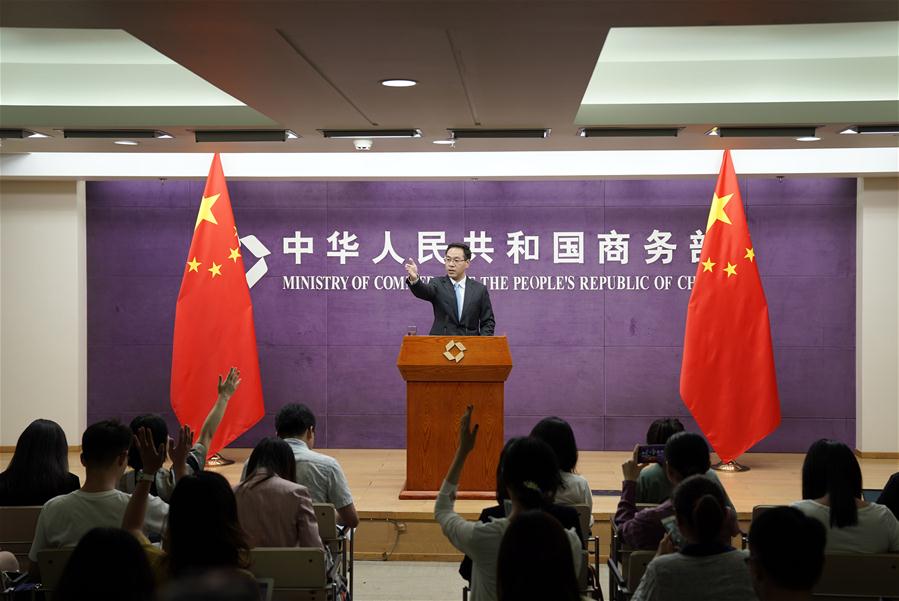
Gao Feng, spokesperson of the Ministry of Commerce, attends a news conference in Beijing, capital of China, July 4, 2019. Because the Sino-U.S. economic and trade frictions were triggered by the U.S. imposition of additional tariffs on Chinese goods, all those tariffs must be lifted if the two countries could reach an agreement, the Ministry of Commerce said Thursday. (Xinhua/Jin Liangkuai)
BEIJING, July 4 (Xinhua) -- Because the Sino-U.S. economic and trade frictions were triggered by the U.S. imposition of additional tariffs on Chinese goods, all those tariffs must be lifted if the two countries could reach an agreement, the Ministry of Commerce (MOC) said Thursday.
On the sidelines of the recently concluded G20 summit in Osaka, the heads of state of China and the United States agreed to resume economic and trade consultations on the basis of equality and mutual respect and the United States said not to impose new tariffs on Chinese products.
Currently, negotiating teams of China and the United States have kept communicating, MOC spokesperson Gao Feng told a news conference.
"It is China's consistent position that Sino-U.S. economic and trade frictions should ultimately be resolved through dialogue and consultation on an equal footing," Gao said. "China welcomes the fact that the United States will not impose new tariffs on Chinese products to avoid further escalation of economic and trade frictions."
Commenting on the U.S. side's argument that the future trade agreement should tilt in the direction favourable to the U.S. side, Gao said the essence of Sino-U.S. economic and trade cooperation is mutual benefit and win-win cooperation.
China has always stressed that consultations should be conducted under the principles of mutual respect, equality and mutual benefit, he said.
"If an agreement could be reached, it should be balanced, equal and mutually beneficial, and China's core concerns must be properly addressed," Gao said.
Commenting on the U.S. side's recent claim that China agrees to purchase large quantities of U.S. agricultural products, Gao said China and the United States are strongly complementary in agricultural trade and have huge room for cooperation.
"Affected by Sino-U.S. economic and trade frictions, agricultural trade between the two countries has taken a blow, which is something we do not want to see," Gao said.
"Trade in agricultural products is an important issue that needs to be discussed between the two sides," Gao said. "We hope that the two sides will proceed from the fundamental interests of the two peoples and find a solution to the problem on the basis of equality and mutual respect."
Gao expressed the hope that the two sides will follow the important instructions given at the meeting of the heads of state of the two countries, accommodate each other's reasonable concerns on the basis of equality and mutual respect, and seek mutually beneficial and win-win solutions to create a stable and predictable trade and investment environment for enterprises of the two countries and the rest of the world.
"This is not only in the interests of China and the United States and their peoples, but is also the common expectation of the international community," he said.



